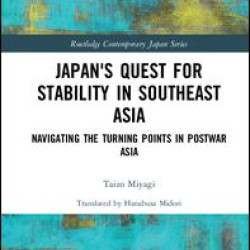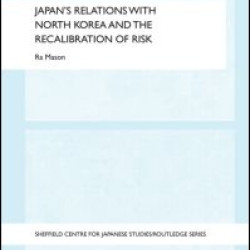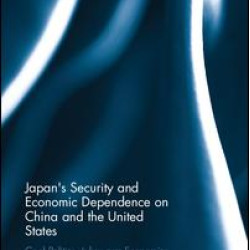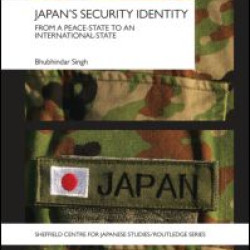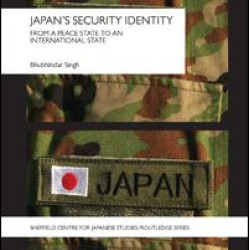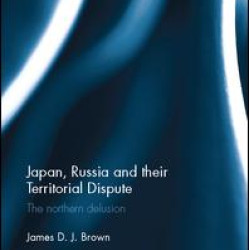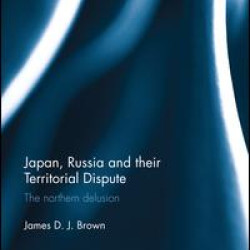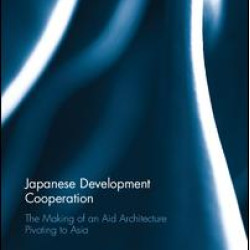Japanese Politics
Brand: Taylor & Francis
Model: 9780415547529
This book focuses on the processes of change taking place in Japan’s politics and economy. The contributors look at a number of different areas including political leadership, the defence industry, security and diplomatic policy, peace building, official development assistance, the economic and busi..
₹8,812.80 ₹11,016.00
Brand: Taylor & Francis
Model: Stock
Historical surveys of postwar Japan are usually established on the grounds that the era is already over, interpreting "postwar" to be the years directly proceeding World War II. However, the contributors to this book take a unique approach to the concept of the postwar period and treat it as a netwo..
₹8,812.80 ₹11,016.00
Brand: Taylor & Francis
Model: Stock
Analysing the importance of Japan’s relationship with Southeast Asia, this book illustrates the hidden trail left by Japan during the period of upheaval that shaped Asia today. It provides a comprehensive account of post-war maritime Asia, making use of internationally sourced primary materials, as ..
₹8,812.80 ₹11,016.00
Brand: Taylor & Francis
Model: Stock
This book examines the role of risk in international relations, including its interactive relationship with domestic civil society, from the case study perspective of Japan’s post-Cold War framing of and responses to North Korea (DPRK). Specifically, it focuses on how agency operates within processe..
₹8,812.80 ₹11,016.00
Brand: Taylor & Francis
Model: Stock
This book examines the role of risk in international relations, including its interactive relationship with domestic civil society, from the case study perspective of Japan’s post-Cold War framing of and responses to North Korea (DPRK). Specifically, it focuses on how agency operates within processe..
₹2,716.54 ₹3,395.68
Brand: Taylor & Francis
Model: Stock
With the rise of China, Japan and many East Asian countries are caught between maximizing profit from economic ties with her, and strengthening alliances with the United States to prevent China from overpowering them. Liberals and realists thus debate over the likelihood of either security tensions ..
₹8,078.40 ₹10,098.00
Brand: Taylor & Francis
Model: Stock
This book examines Japanese post-Cold War security policy, analyzing how Japan reacted to the end of the Cold War, the results of the transformation in the post-Cold War security environment, and exactly how Japanese security has changed from its Cold War design...
₹8,812.80 ₹11,016.00
Brand: Taylor & Francis
Model: Stock
This book examines Japanese post-Cold War security policy, analyzing how Japan reacted to the end of the Cold War, the results of the transformation in the post-Cold War security environment, and exactly how Japanese security has changed from its Cold War design...
₹2,643.10 ₹3,303.88
Brand: Taylor & Francis
Model: Stock
The purpose of this book is to provide objective analysis of the Japanese government’s prospects of success in the territorial dispute between Japan and Russia over four islands off the northeast coast of Hokkaido . Based on careful consideration of a range of historical, economic, security, and soc..
₹2,789.98 ₹3,487.48
Brand: Taylor & Francis
Model: Stock
The purpose of this book is to provide objective analysis of the Japanese government’s prospects of success in the territorial dispute between Japan and Russia over four islands off the northeast coast of Hokkaido . Based on careful consideration of a range of historical, economic, security, and soc..
₹8,812.80 ₹11,016.00
Brand: Taylor & Francis
Model: Stock
This book traces developments in Japanese politics from the end of the Asia Pacific wars to the present day. Written by an experienced Japanese scholar, it looks at Japanese politics from four aspects: high politics, interest-centered politics, life-centered politics, and globalization...
₹8,445.60 ₹10,557.00
Brand: Taylor & Francis
Model: Stock
This book examines Japan’s development assistance as it transitions away from "Official Development Assistance" and towards "Development Cooperation." In this transition, the strong relationships between Japanese development policy and comprehensive security, diplomacy, foreign, domestic and economi..
₹8,812.80 ₹11,016.00




